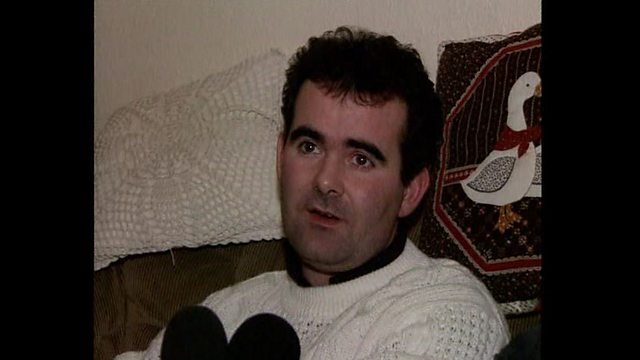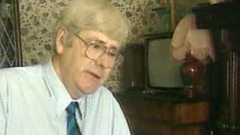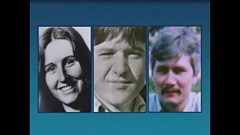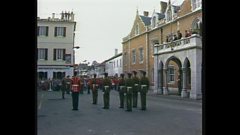
Sir John May publishes his report on the Maguire Seven
Sir John May publishes the report on his inquiry into the case of the Maguire Seven. He concludes that the Maguire Seven were the victims of a serious miscarriage of justice.
Joshua Rozenberg reports on Sir John May’s publication of his report on the inquiry into the case of the Maguire Seven (please see context below).
Over footage of the release of the Guildford Four, Rozenberg explains that on 20 October 1989, following the quashing of the Guildford Four convictions, Sir John May was appointed to chair an inquiry into that case and the related case of the Maguire Seven.
However, planned public hearings into the case of the Guildford Four had to be abandoned because three former Surrey police officers have still not been tried on charges (arising from the case) of conspiracy to pervert the course of justice.
Sir John therefore began public hearings on the other case he had been asked to investigate, that of the Maguire Seven.
Archive footage of Sir John May and Anne Maguire at the inquiry is shown.
Rozenberg explains that in an experiment in 1990 for the inquiry, a leading forensic scientist (Professor Thorburn Burns) checked the original scientific tests used to convict the Maguire family of handling explosives. Professor Burns found that people could have traces of nitro-glycerine on their hands quite innocently. Archive footage of Professor Burns’ test is shown – followed by archive footage of Mrs. Anne Maguire and her supporters drinking champagne. The Maguires were cleared by the Court of Appeal only on the grounds that they could have had traces of nitro-glycerine on their hands innocently. Other grounds suggested by Sir John May’s initial findings were rejected by the court.
In Sir John May’s report he states that the Maguire Seven were the victims of a serious miscarriage of justice: “If the Attorney General Mr. Silkin in 1974/75 had had before him the full information which I now have they wouldn’t have been charged and tried at all.”
Anne Maguire’s son Vincent is seen sitting beside his father Patrick at home: “I feel angry that it’s taken so long to vindicate us when the facts were known I believe in 1975. Someone did know obviously that the truth wasn’t being told about us. That hurts.”
Joshua Rozenberg concludes his report outside the Home Office; he informs us that Sir John May has called for a new independent review body to be set up by parliament to investigate alleged miscarriages of justice.
CONTEXT
On 5 October 1974 the Provisional Irish Republican Army (PIRA) targeted Guildford, Surrey, because it was situated close to a number of garrison towns. The PIRA planted two six-pound gelignite bombs in two pubs. The first exploded just before 9.00pm in the Horse and Groom, destroying the front of the building and shattering the windows of neighbouring shops.
It killed Paul Craig, a plasterer (22 years old); two members of the Scots Guards, William Forsyth (18) and John Hunter (17); and two members of the Women’s Royal Army Corps, Caroline Jean Slater (18) and Ann Ray Hamilton (19). A further sixty-five persons were wounded.
After the first explosion, other public houses were evacuated, including the Seven Stars where the second bomb exploded at approximately 9.35 pm without causing any serious injuries.
On November 7 1974 Gunner Richard Dunne, a soldier (42) and Alan Horsley, a sales clerk (20) were killed when a PIRA bomb exploded in the King’s Arms in Woolwich. Twenty-six people, including five soldiers, were injured.
In December 1974 the police arrested three men and a woman: Gerry Conlon, Paul Hill, Patrick Armstrong and Carole Richardson. In October 1975 these four were convicted of the Guildford and Woolwich bombings and given life sentences. The group was known as the Guildford Four.
On 4 March 1976 the Maguire Seven were convicted of making the explosives used in these bombings. The Maguire Seven were: - Anne Maguire, Patrick Maguire (Anne’s husband), Patrick Maguire (son of Anne and Patrick), Vincent Maguire (son of Anne and Patrick), Sean Smyth (brother of Anne), Patrick O’Neill (family friend) and Giuseppe Conlon (brother-in-law of Anne Maguire and father of Gerry Conlon).
Over the years, the cases of the Guildford Four and the Maguire Seven came under increasing legal scrutiny and the range of those seeking a review of the convictions extended widely. On 17 October 1989 it was announced that corruption proceedings would be taken against the police involved in the conviction of the Guildford Four. Two days later, with the exception of Paul Hill, those convicted for the bombings were released. This followed an announcement by the Director of Public Prosecutions that it would be wrong for the Crown ‘to seek to sustain’ the convictions of 1975 on the basis of confessions that were later retracted.
The Court of Appeal had decided that the DPP in 1975 had suppressed scientific evidence which conflicted with the confessions. Paul Hill remained in custody because he was implicated in a case that had not yet been resolved. His conviction was eventually quashed in April 1994.
On 26 June 1991 the Court of Appeal overturned the sentences on the Maguire Seven – all of whom had completed their sentences.
Afterwards many criticised the court for dismissing most of the grounds of appeal and for simply concluding that the hands of the convicted could have been innocently contaminated with nitro-glycerine.
Duration:
This clip is from
More clips from ����ý Six O'Clock News
-
![]()
'He is not a European spy'
Duration: 01:42
-
![]()
Devastation in Omagh—17/08/1998
Duration: 01:53
-
![]()
Gibraltar victims named—07/03/1988
Duration: 01:16
-
![]()
Gibraltar's Changing of the Guard targeted—07/03/1988
Duration: 01:30





